- Home
- F. Paul Wilson
Repairman Jack 03 - Conspiracies Page 8
Repairman Jack 03 - Conspiracies Read online
Page 8
"I never thought it would happen to Ceilia. She's so ... "
His voice trailed off.
Jack said nothing. This was the time to keep quiet and listen. This was when he tended to learn the real deal about the customer. He still didn't have a handle on Schaffer. He did know he didn't particularly care for the guy. Maybe it was the Mr. Bigtime Success Story attitude.
"I just don't understand it. Gus seemed like such a good guy when they were dating and engaged. I liked him. An accountant, white collar, good job, clean hands, everything I wanted for Ceil. I helped him get his job. He's done well. But he beats her." Schaffer's lips thinned as they stew back over his teeth. "Dammit, he beats the shit out of her. And you know what's worse? She takes it! She's put up with it for ten years! I'm to the point where I'm thinking the best thing that could happen to Ceil was Gus meeting with some sort of fatal accident."
Jack knew all this. They'd covered this ground during their first meeting.
"You're probably right," he said before Schaffer could go on.
Schaffer stared at him. "You mean you'll ... ?"
"Kill him?" Jack shook his head. "Forget it."
"But I thought—"
"Forget it. Sometimes I make a mistake. If that happens, I like to be able to go back and fix it."
Schaffer's expression flickered between disappointment and relief, finally settling on relief.
"You know," he said with a small smile, "as much as I'd like Gus dead, I'm glad you said that. I mean, if you'd said okay, I think I'd have set you to it." He shook his head and looked away. "Kind of scary what you can come to."
"She's your sister. Someone's hurting her. You want him stopped but you can't do it yourself. Not hard to understand how you feel. Anyway, why do you need me? Lots of laws against this stuff, you know."
"Right. Sure there are. But you've got to sign a complaint. Ceil won't do that."
"She's probably afraid."
"Afraid, hell! She defends him, says he's under a lot of pressure and sometimes he just loses control. She says most of the time it's her fault because she gets him mad, and she shouldn't get him mad. Can you believe that shit? She came over to my place one night, two black eyes, a swollen jaw, red marks around her throat from where he was choking her. I lost it. I charged over to their place ready to kill him with my bare hands. He's a big guy, but I'm tough. And I'm sure he's never been in a fight with someone who punches back. When I arrived screaming like a madman, he was ready for me. He had a couple of neighbors there and he was standing inside his front door with a baseball bat. Told me if I tried anything he'd defend himself, then call the cops and press charges for assault and battery. I told him if he came anywhere near my sister again, he wouldn't have an unbroken bone left in his body to dial the phone with!"
"Sounds like he knew you were coming."
"He did! That's the really crazy part! He knew because Ceil had called from my place to warn him! And the next day he sends her roses, says how much he loves her, swears it'll never happen again, and she rushes back to him like he's done her a big favor. Can you beat that?"
Jack had felt himself going through a slow burn as Schaffer was speaking. Now he turned in his seat to face him.
"Now you decide to tell me this?" He wasn't quite shouting, but Schaffer could have no doubt he was pissed.
"What? What's wrong?"
"Don't give me that! You knew nobody'd get involved in this once they learned your sister's some sort of masochist!"
"She's not! She—"
"Tell you what," Jack said, reaching for the door handle, "you go get a bat of your own and wait for this guy in an alley or a parking lot. Take care of it yourself."
"Wait! Please! Don't think I haven't thought of it. But I've already threatened him—in front of witnesses. Anything happens to him, I'll be number one suspect. And I can't get involved in anything like that, in a felony. I mean I've got my own family to consider, my business. I want to leave something for my kids. I do Gus, I'll end up in jail, Gus'll sue me for everything I'm worth, my wife and kids will wind up in a shelter somewhere while Gus moves into my house. Some legal system!"
Jack waited through a long pause. Here was the familiar Catch-22 that kept him in business.
Schaffer finally said, "I guess I figured if I got you out here and you saw how big he is and how small and frail Ceil is, you'd ... "
"I'd what? Go all mushy? Forget it. Busting up this slug isn't going to change things. Sounds like your sister's got as big a problem as he does."
"She does. I've talked to a couple of doctors about it. It's called co-dependency or something like that. I don't pretend to understand it." He looked at Jack. "Can you help?"
"I don't see how. Domestic stuff is complicated to begin with, and this situation sounds like it's gone way past complicated. Not the sort of thing my kind of services can help."
"I know what you're saying. I know they need shrinks—at least Ceil does. Gus ... I don't know. I think he's beyond therapy. I got the feeling Gus likes beating up on Ceil. Likes it too much to quit, no matter what. But I want to give it a try."
"If that's true, I can't see him getting chummy with a shrink just because you or anyone else says he should."
"Yeah. But if he was hospitalized ... " Schaffer raised his eyebrows, inviting Jack to finish the thought.
"You really think if your brother-in-law was laid up in a hospital bed for a while, a victim of violence himself, he'd have some kind of burst of insight and ask for help?"
"It's worth a try."
"No, it isn't. Save your money."
"Well, then, if he doesn't see the light, I could clue his doctor in and maybe arrange to have one of the hospital shrinks see him while he's in traction."
"You really think that'll change anything?"
"I don't know. I've got to try something short of killing him."
"And what if those somethings don't work?"
His eyes took on a bleak look. "Then I'll have find a way to take him out of the picture. Permanently. Even if I have to do it myself."
"I thought you were worried about your family and your business."
"She's my sister, dammit!"
Jack thought about his own sister, the pediatrician. He couldn't imagine anyone beating up on her. At least not more than once. She'd had a brown belt in karate at seventeen and had never taken guff from anyone. She'd either kick the crap out of you herself or call big brother, the judge, and submerge you to your lower lip in an endless stream of legal hot water. Or both.
But if she were a different sort, and somebody was beating up on her, repeatedly ...
"All right," Jack said. "I'll look into it. I'm not promising anything, but I'll see if there's anything I can do."
"Hey, thanks. Thanks a—"
"That's half down just for looking into it—no refund. Even if I decide not to do anything. The rest is due when I've done the job."
Schaffer's eyes narrowed. "Wait a sec. Lemme get this straight. You get five large with no commitment?"
"Might take me weeks to learn what I need to know just to make that decision."
"What do you need to know? How about—?"
"We're not practicing 'the Art of the Deal' here. You've already held out on me about this co-dependency thing; how do I know you're not hiding something else?"
"I'm not. I swear!"
"Those are the terms. Take it or leave it."
For a moment it looked as if Schaffer might leave it. Then he shook his head.
"You're asking me to bet on a crap shoot—blindfolded. You hold all the aces."
"You're mixing metaphors, but you've got the picture."
"Aw, what the hell." Schaffer sighed and reached into his breast pocket. He handed an envelope across to Jack. "It's only money. Here. Take it."
Without hiding his reluctance, Jack tucked the envelope inside his shirt.
"When do you start?" Schaffer said.
Jack opened the door and stepped out of the
Jag.
"Tomorrow night."
5
Jack started back to Manhattan, then remembered he was due to pick up his mail. And since he was already in Queens, why not?
He rented boxes in five mail drops—two in Manhattan, one in Hoboken, one in Brooklyn, and a large box in Astoria on Steinway Street. But he used that drop as a collection point only. Every two weeks his other drops bundled up his mail and sent it to Astoria. Every two weeks Jack hopped the R train and collected all his mail. An easy trip—the drop was only a couple of blocks from the subway stop.
He double-parked in front of the big, brightly-lit window of Carsman's Mail and Packaging Services and trotted inside. He'd chosen Carsman's because it was open twenty-four hours a day. The clerk behind the barred window at the rear barely looked up as he entered, but Jack kept his head turned anyway. He unlocked the box, scooped out the four manila envelopes inside, and was out the door and tooling down Steinway Street in Abe's truck in less than a minute.
In and out, showing up at all odd hours of the night, seeing no one, speaking to no one—the only way to fly.
As he drove he emptied the envelopes onto the seat beside him. At successive stop lights he sifted through the letters. Most were bills for the credit cards he carried under various identities. But one envelope addressed to John L. Tyleski caught his eye. Tyleski was one of his more recent noms de guerre. Jack didn't remember any mail for him before. He tore open the envelope.
Jack smiled. Because of John L. Tyleski's excellent credit record, a Maryland bank had preapproved him for a Visa card.
Damn nice of you people.
Credit cards ... Jack hated them. Plastic money left a trail of electronic footprints, a detailed record of every purchase—books, theater tickets, clothing, plane tickets—a diagram of your lifestyle, a map of your existence. The very things he wanted most to avoid.
He'd held out as long as he could, but with each passing year it had become increasingly difficult to get by without them. A man with no credit cards raised eyebrows, and the last thing Jack wanted to attract was a second look. He'd found himself in an odd position: in order to remain invisible, he'd have to become a part of the national credit databases.
So he jumped into Plastic Moneyland with both feet. He now kept four credit card accounts running at once, each under a different name, each attached to a different mail drop. He paid his monthly bills promptly with USPS money orders. He could have used another money order service with equal anonymity, but the idea of using a wing of the very government he was hiding from appealed to him.
Early last year he'd added John L. Tyleski as an additional cardholder to the Amex account of John J. O'Mara.
Tyleski's record of payment since then had been so sterling that a competitor was offering him his own account.
"On behalf of Mr. Tyleski," Jack said, "I wish to thank you very much. We will sign him up first thing tomorrow."
Something deeply satisfying in the predictability of large financial organizations.
And in a few months, John J. O'Mara would request that John L. Tyleski's name be removed from his Amex account, leaving Tyleski as a free and independent entity in the Visa databank.
The timing was perfect. He'd been planning to visit Ernie tomorrow and start legitimizing a new identity anyway. He'd eventually attach that to the Tyleski Visa account.
He smiled as he paid the toll at the Midtown Tunnel. This was shaping up to be a busy week.
Salvatore Roma stood at the window of his suite on the top floor of the Clinton Regent Hotel and gazed at the blazing skyline.
6
He had been staying at the hotel since Monday, preparing for the SESOUP conference. A few of the attendees had arrived today to get in some sightseeing before the conference began. Tomorrow the rest would arrive, filling the hotel. Every room was booked by an attendee, just as he'd planned.
Anticipation bubbled through him, making him almost giddy. All the pieces were falling together perfectly. By this time tomorrow night, the building would be packed with those special, chosen people.
And then it would begin.
After endless waiting, after repeated reverses at the hands of lesser beings, his time had come at last. He'd earned his reward, paid for it with blood and lives—his own—and now he was due to collect. Past due.
All he needed were the proper tools. The people packing this building over the next few days would help provide those. After that, nothing could stop him. And he would grind to pulp anyone who got in his way.
Mine, he thought, gazing at the city and beyond. Mine at last.
THURSDAY
1
Jack had time, so he walked down to Midtown. It had rained last night as a front pushed through, and the temperature had dropped a good ten or twelve degrees below yesterday's. The breeze had a raw edge to it. Coats were back on, legs were hidden again. Spring seemed an empty dream—
He'd decided to dress like a Midtown tourist today, so he was wearing Nikes and a black-and-purple nylon warm-up over a Planet Hollywood T-shirt. The indispensable fanny pack completed the look. The nylon made an annoying rhythmic swishing sound as he quick-walked down Columbus, which magically became Ninth Avenue once he crossed Fifty-ninth Street. He paused to check out the trays of used paperbacks in the concrete plaza on the southeast corner of Fifty-seventh, then moved on. From there the avenue began its downward slope toward Hell's Kitchen.
At least that was what they used to call it. The presence of the Intrepid Museum and the Javits Convention Center had somewhat revitalized the area, but even so, real estate folks had found a neighborhood called Hell's Kitchen a tough sell. So they'd started calling it "Clinton"—not after the president, but the former governor whose carriage house was still around here somewhere, a leftover from the old, old days when the area was a summer retreat for Manhattan's wealthier folk.
Then the Irish moved in. When the tenements rose, people started calling it Hell's Kitchen. Italians and Greeks and Puerto Ricans followed, successive immigrant waves moving through the same apartments.
The buildings tended to average about five stories in height with brick fronts, some decorative, most just plain red clay, thinly veiled with a steel lace of fire escapes clinging to their faces. Most of the streets, sloping upward on his left and down to the Hudson on his right, were lined with budding trees—Jack had forgotten how many trees grew in Hell's Kitchen. Reminded him in some ways of his own neighborhood before the great gentrification of the eighties.
Many of the doorways he passed were occupied, either by sleeping men or smoking women.
Ahead of Jack a guy was peeking in the windows of all the parked cars he passed. He was trying to be coy about it, but no question: an hour from now, one of those cars would be missing.
Jack remembered the Clinton Regent as being somewhere in the lower Fifties or upper Forties. He should have looked up the address before starting out. No matter. He'd find it.
He thought about swinging down by the docks and grabbing a cup of coffee at the Highwater Diner. He'd done a job for the owner, George Kuropolis, a while ago, and had been impressed with how clean he kept the place. He glanced at his watch. No time. Maybe later.
No shortage of restaurants in the area, and just about every ethnic group that had passed through the neighborhood was represented—lots of bodegas, a Greek bakery, Italian delis, Irish pubs, an Afghan kabob place, Caribbean, Thai, Chinese, Senegalese, even an Ethiopian restaurant.
What do they serve in an Ethiopian restaurant?
He'd have to check it out. If nothing else, meals would not be boring on this gig.
The overcast sky threatened rain, but that didn't seem to faze the tourists. The West Side was full of foreigners. He was stopped by a group of Japanese women who seemed to know only one word.
"Gucci? Gucci?" they said.
He pointed them toward Fifth Avenue. "Gucci."
Then a dapper elderly gent with a British accent stopped him at a corner a
nd wanted to know which way to Grand Central. Jack pointed him toward Forty-second and told him to walk left—couldn't miss it.
"But now let me ask you something," Jack said as the man thanked him and began to walk away.
He was bothered by the fact that, despite his best efforts to dress like an out-of-towner, two foreigners had chosen him to ask directions.
"How did you know I wasn't a tourist myself?"
"That nylon thingie you're wearing, for one," the Brit said, smoothing his neat little white mustache. "Whenever we see one in London, we know there's an American inside. The same goes for that miniature rucksack on your hip."
"Okay, but how did you know I wasn't from Des Moines or someplace?"
"By the way you crossed the street. If you'll notice, native New Yorkers completely ignore the don't walk signals, and rarely break stride as they cross the street."
Have to remember that, Jack thought.
He moved on, stopping at all the don't walks, and found the Clinton Regent Hotel in the upper Forties between Ninth and Tenth. A whopping eight stories tall, it towered over its neighbors.
A low marquee overhung a small paved plaza shaded by half a dozen slim elms in planters. Through the windows to the left of the revolving doors he could see a half-filled coffee shop; to the right, the crowded lobby. He stepped inside and stuttered to a stop as a deep uneasiness wrapped around him like a tentacle.
He looked around the low-ceilinged lobby, wondering what it was about this place that made him so uncomfortable. Just people, standing, sitting, wandering about. No one particularly sinister looking or threatening. They were all so ordinary he wondered if he was in the right place. Then he spotted a backpacking girl wearing a T-shirt decorated with the familiar black-eyed ET-ish alien and he knew this had to be the place.
As he stood there the sensation eased away, but did not leave entirely.
Jack spotted a tall, lanky figure waving from an alcove: Lew Ehler, and he was motioning to Jack to join him.

 Crisscross
Crisscross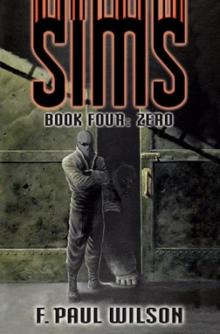 Ground Zero
Ground Zero Short Stories
Short Stories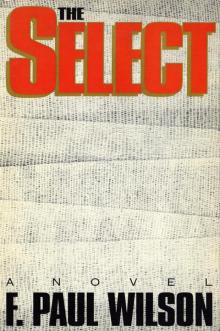 The Select
The Select Codename
Codename Bloodline
Bloodline A Soft Barren Aftershock
A Soft Barren Aftershock The Tomb
The Tomb The Complete LaNague
The Complete LaNague The Tery
The Tery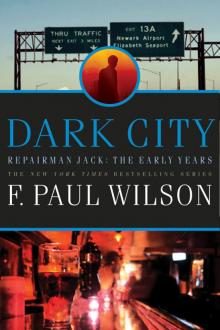 Dark City
Dark City Deep as the Marrow
Deep as the Marrow The Fifth Harmonic
The Fifth Harmonic Conspiracies
Conspiracies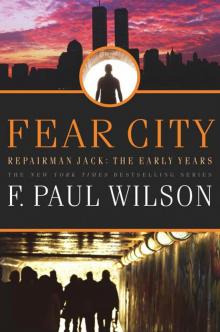 Fear City
Fear City Wheels Within Wheels
Wheels Within Wheels Wayward Pines
Wayward Pines The Portero Method
The Portero Method All the Rage
All the Rage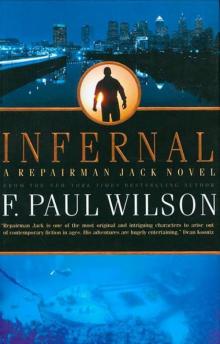 Infernal
Infernal The Barrens & Others
The Barrens & Others The Keep
The Keep Quick Fixes: Tales of Repairman Jack
Quick Fixes: Tales of Repairman Jack Virgin
Virgin Hosts
Hosts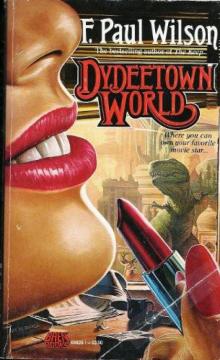 Dydeetown World
Dydeetown World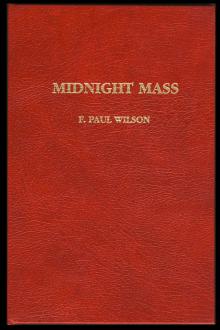 Midnight Mass
Midnight Mass Black Wind
Black Wind The Christmas Thingy
The Christmas Thingy The Last Rakosh
The Last Rakosh The Last Christmas: A Repairman Jack Novel
The Last Christmas: A Repairman Jack Novel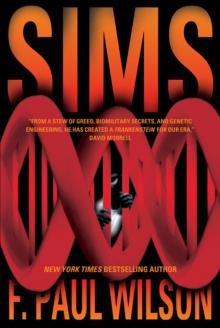 SIMS
SIMS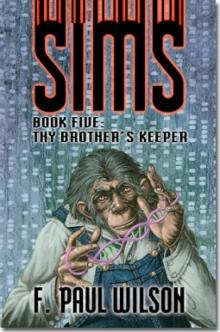 Thy Brother's Keeper
Thy Brother's Keeper Panacea
Panacea The Touch
The Touch Scenes from the Secret History
Scenes from the Secret History Scenes From the Secret History (The Secret History of the World)
Scenes From the Secret History (The Secret History of the World)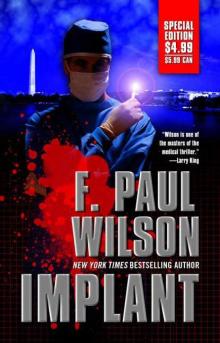 Implant
Implant The Dark at the End
The Dark at the End Fatal Error
Fatal Error Wardenclyffe
Wardenclyffe Sibs
Sibs The God Gene
The God Gene The Void Protocol
The Void Protocol Artifact
Artifact The Compendium of Srem
The Compendium of Srem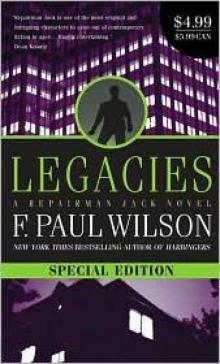 Legacies
Legacies Reprisal
Reprisal Jack: Secret Vengeance
Jack: Secret Vengeance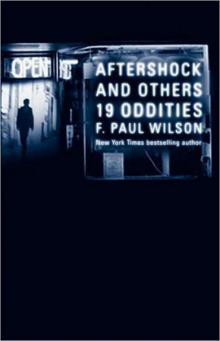 Aftershock & Others: 19 Oddities
Aftershock & Others: 19 Oddities By the Sword
By the Sword Interlude at Duane's (Thriller: Stories to Keep You Up All Night)
Interlude at Duane's (Thriller: Stories to Keep You Up All Night) Fatal Error rj-13
Fatal Error rj-13 Crisscross rj-8
Crisscross rj-8 Codename: Chandler: Fix (Kindle Worlds Novella)
Codename: Chandler: Fix (Kindle Worlds Novella)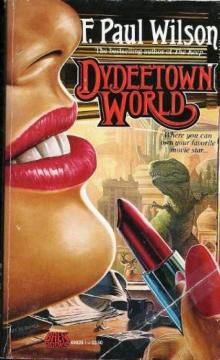 Dydeetown World lf-4
Dydeetown World lf-4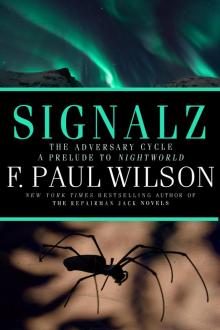 Signalz
Signalz Codename_Chandler_Fix
Codename_Chandler_Fix The Dark at the End (Repairman Jack)
The Dark at the End (Repairman Jack) The Complete Adversary Cycle: The Keep, the Tomb, the Touch, Reborn, Reprisal, Nightworld (Adversary Cycle/Repairman Jack)
The Complete Adversary Cycle: The Keep, the Tomb, the Touch, Reborn, Reprisal, Nightworld (Adversary Cycle/Repairman Jack) Repairman Jack 03 - Conspiracies
Repairman Jack 03 - Conspiracies Ground Zero rj-13
Ground Zero rj-13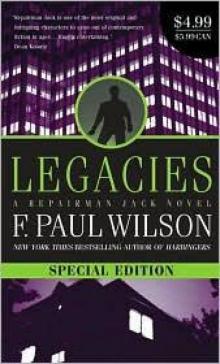 Repairman Jack 02 - Legacies
Repairman Jack 02 - Legacies The Dark at the End rj-15
The Dark at the End rj-15![Repairman Jack [02]-Legacies Read online](http://i1.bookreadfree.com/i/03/21/repairman_jack_02-legacies_preview.jpg) Repairman Jack [02]-Legacies
Repairman Jack [02]-Legacies Double Threat
Double Threat The Tery lf-5
The Tery lf-5 The God Gene: A Novel
The God Gene: A Novel Wayward Pines: The Widow Lindley (Kindle Worlds Novella)
Wayward Pines: The Widow Lindley (Kindle Worlds Novella) Reborn ac-4
Reborn ac-4 Reprisal ac-5
Reprisal ac-5 New Title 1
New Title 1 Healer lf-3
Healer lf-3 An Enemy of the State lf-1
An Enemy of the State lf-1 Interlude at Duane's
Interlude at Duane's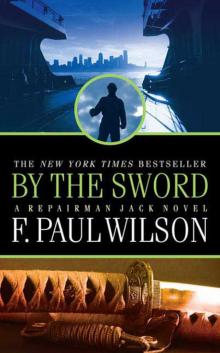 By the Sword rj-12
By the Sword rj-12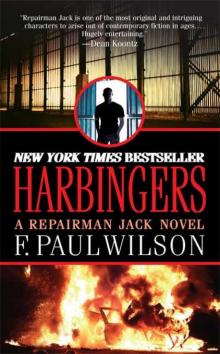 Hardbingers rj-10
Hardbingers rj-10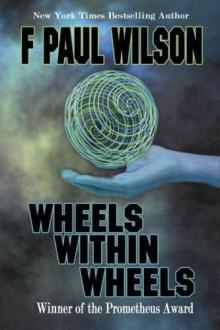 Wheels Within Wheels lf-2
Wheels Within Wheels lf-2 Jack: Secret Circles
Jack: Secret Circles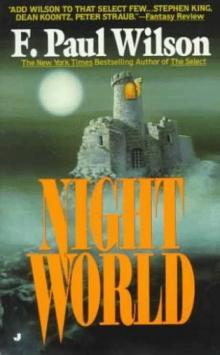 Nightworld ac-6
Nightworld ac-6 Quick Fixes - tales of Repairman Jack
Quick Fixes - tales of Repairman Jack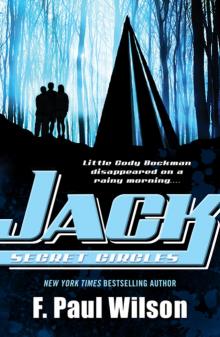 Secret Circles yrj-2
Secret Circles yrj-2 Jack: Secret Histories
Jack: Secret Histories Haunted Air rj-6
Haunted Air rj-6 An Enemy of the State - a novel of the LaNague Federation (The LaNague Federation Series)
An Enemy of the State - a novel of the LaNague Federation (The LaNague Federation Series) Repairman Jack 05 - Hosts
Repairman Jack 05 - Hosts Cold City (Repairman Jack - the Early Years Trilogy)
Cold City (Repairman Jack - the Early Years Trilogy) The Peabody-Ozymandias Traveling Circus & Oddity Emporium
The Peabody-Ozymandias Traveling Circus & Oddity Emporium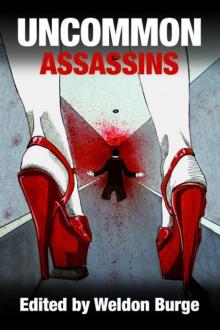 Uncommon Assassins
Uncommon Assassins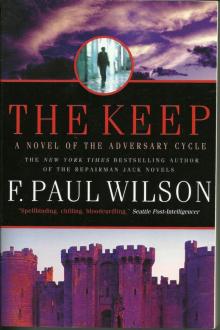 Adversary Cycle 01 - The Keep
Adversary Cycle 01 - The Keep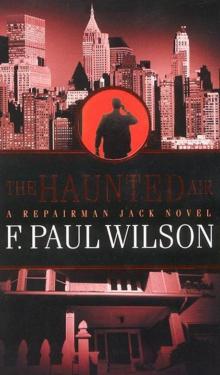 Repairman Jack 06 - The Haunted Air
Repairman Jack 06 - The Haunted Air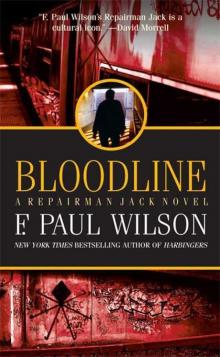 Bloodline rj-11
Bloodline rj-11 Ultimate Supernatural Horror Box Set
Ultimate Supernatural Horror Box Set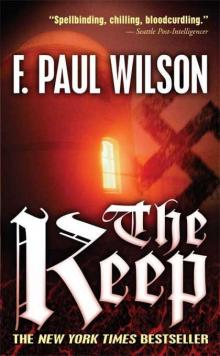 The Keep ac-1
The Keep ac-1 Repairman Jack 04 - All the Rage
Repairman Jack 04 - All the Rage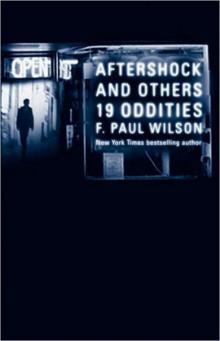 Aftershock & Others
Aftershock & Others All the Rage rj-4
All the Rage rj-4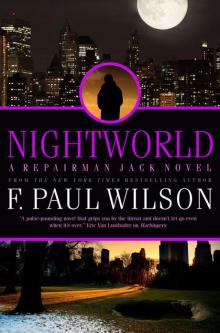 Nightworld (Adversary Cycle/Repairman Jack)
Nightworld (Adversary Cycle/Repairman Jack) Conspircaies rj-3
Conspircaies rj-3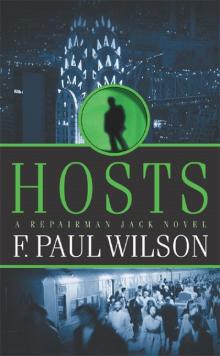 Hosts rj-5
Hosts rj-5 Infernal rj-9
Infernal rj-9 The God Gene: A Novel (The ICE Sequence)
The God Gene: A Novel (The ICE Sequence)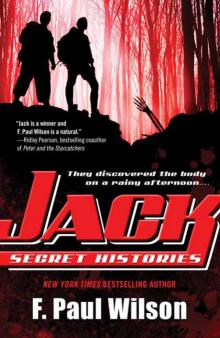 Secret Histories yrj-1
Secret Histories yrj-1